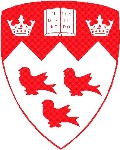|
 |
| 13th Canadian IBRO-USCRC School of Neuroscience |
|
|
5/13/2019
-> 5/31/2019
|
13th Canadian IBRO-USCRC School of Neuroscience:
Neural Circuits and Plasticity in Health and Disease
Montreal, QC and Toronto, ON, May 13 – 31, 2019
The school focuses on the development and plasticity of neural circuits, and on mechanisms to repair circuits that are damaged or that develop abnormally.
Deadline for applications (on-line only): January 15, 2019 (11:59 p.m. CET)
Organizing committee of Canadian IBRO-USCRC Schools of Neuroscience:
Dr. Ellis Cooper – Chair, Dr. Albert J. Aguayo, Dr. Ante L. Padjen (Secretary), Dr. Melissa Vollrath and Dr. David Ragsdale (Program Coordinators).
(All members of McGill University)
Aims and Scope of the School:
This Canadian IBRO School of Neuroscience offers an advanced neuroscience course for young investigators from Africa and Latin America. The School is intended for 12-14 promising young trainees from Africa and Latin America who have clear leadership potential in the scientific community of their home countries. Laboratory research experience of applicants is essential. Unique features of the School are hands-on experience in the laboratory of their choice and attendance and presentation of their work in poster format at the Canadian Association for Neuroscience’s annual meeting, a meeting that brings together over 1000 researchers, mostly from across Canada and the United States.
Educational Objectives:
1. To deepen participants’ understanding of mechanisms related to development, plasticity, and repair of neural circuits.
2. To acquaint the participants with a variety of experimental approaches and analytical tools applied on different model system; five days of the school are dedicated to provide individual lab experience for each student.
3. Provide an opportunity for students to present their research; tutor students in the analysis of data and literature.
4. Provide general guidance on the preparation of research applications, presentations, manuscripts. Two sessions will be dedicated to discussion about science and about ethics of scientific research.
5. To foster long-lasting links with Canadian neuroscientists and to forge new scientific contacts between investigators in Canada, Africa, and Latin America.
Program description:
1) The first part of the school is taking place in Montreal (arrival May 12, 2019) where students are taught through a series of interactive sessions and demonstrations in various state-of-the-art laboratories. The Faculty consists of prominent neuroscientists from Montreal’s McGill University, Montreal Neurological Institute, Université de Montréal and Institute de la Recherche Clinique de Montreal with experience in previous IBRO Schools. The language of the school is English.
Students will participate in interactive seminars and lab sessions covering a wide range of topics. A partial list includes: i) Axonal guidance and signals that regulate axon regeneration; ii) Neuronal diversification of astrocytes, and astrocyte growth; iii) Degeneration and repair of the retina; iv) Structural plasticity; v) Neural map formation and sensory coding in the olfactory system and the visual system; vi) Computational models of synaptic integration (on dendrites); vii) Use of model organisms (zebrafish, xenopus levis, c. elegans, drosophila) to investigate the development of neural circuits, as well as neurodegenerative diseases; viii) gene editing techniques. ix) Science and Ethics of scientific research.
2) The second part of the school takes place in Toronto (May 22 – 25, 2019) to participate in the CAN Meeting and satellite symposia.
3) The third part of the school (Montreal, May 27-31, 2019) students will have the opportunity to spend five days in a neuroscience laboratory to expand their research experience and gain new expertise.
Return home date: June 1, 2019
Who should apply to this School?
Young investigators from Africa and Latin America are encouraged to apply, primarily graduate students, postdoctoral fellows and junior faculty. IBRO Alumni are welcome to apply. Experience in experimental research is very important to maximize the benefits of the school. Students will be chosen in consultation with IBRO’s regional committees for Africa and Latin America. The specific criteria include: academic achievements and leadership potential, publications, letters of reference, and a statement of how attending this School will benefit the applicant’s research career and their research environment.
What costs will be covered for selected applicants?
Successful applicants will have all their expenses paid for by this School. This includes traveling (air fare from home to Montreal and back, train fare Montreal -Toronto and back) and living expenses (housing, meals and local transportation in both cities), as well as the registration to Canadian Association for Neuroscience Annual meeting. Visas and other immigration arrangements are the responsibility of each student.
Application for the school are done online (to be opened November 13, 2018)
Application deadline: January 15, 2019 (11:59 p.m. CET)
Please feel free to send all your queries to canadian.schools@ibro.org
Co-sponsors:
IBRO US-Canada Regional Committee; Society for Neuroscience; Canadian Association for Neuroscience; CIHR - INMHA; Montreal Neurological Institute, McGill University; Department of Neurology and Neurosurgery, McGill University; University of British Columbia.
|
ALP
9/4/2018 1:00:08 PM
Δ:ALP
2/24/2020 11:23:22 PM
|
|
|
May 2019
| S |
M |
T |
W |
Th |
F |
Sa |
|
|
|
1 |
2 |
3 |
4 |
| 5 |
6 |
7 |
8 |
9 |
10 |
11 |
| 12 |
13 |
14 |
15 |
16 |
17 |
18 |
| 19 |
20 |
21 |
22 |
23 |
24 |
25 |
| 26 |
27 |
28 |
29 |
30 |
31 |
|

|


